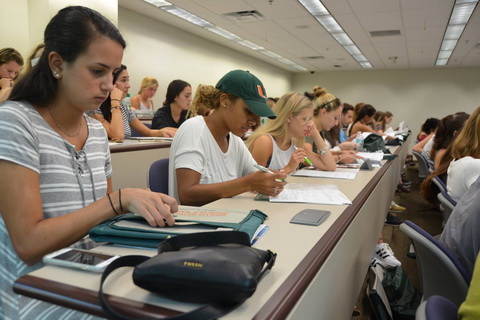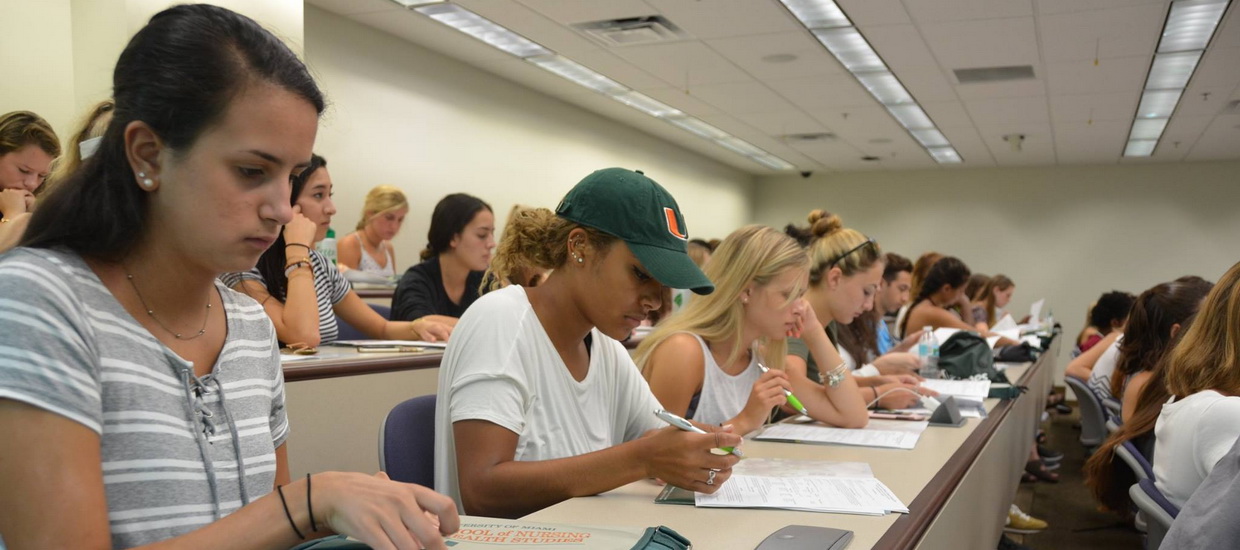1. Why is the University of Miami a great place to study?
Miami has a great energy, unlike that of any other location! Our community is a place of economic growth with a thriving economy and active business and financial district. Year-round temperatures average between 80-90 degrees Fahrenheit, making every day a great day to enjoy the outdoors in sunny south Florida. Miami has a vast array of offerings and events including music, fine art, history, culinary events, performing arts, water-based activities, professional sporting teams, and a very active social scene, not to mention the world-renowned nightlife.
2. What makes the University of Miami’s program different than other nurse anesthesia programs?
We believe our program has established itself among the forerunners in nurse anesthesia education. This is attributed to our rigorous academic standards and our unique clinical experiences as a result of our partnership with our 14 clinical partners. The school and program are committed to reevaluating our programs and plans of study to improve our offerings to our students. We incorporate state of the art simulations in most course work across the curriculum to help students learn to clinically apply didactic principles. As we have enriched our program to the doctoral degree, we are not only preparing clinical experts, but also professionals who are prepared to significantly influence health care delivery and the development of health care systems and policies locally and nationally.
3. What clinical sites are part of the Doctor of Nursing Practice - Nurse Anesthesia Track education?
The University of Miami BSN-DNP Nurse Anesthesia Track program utilizes clinical sites that offer a variety of practice settings which further enhance our students’ educational experiences. Our primary sites are University of Miami Health System (UHealth Tower, Sylvester Comprehensive Cancer Center, Bascom Palmer Eye Institute and Lennar Foundation Medical Center) and Jackson Health System - which includes Jackson Memorial Hosptial, Holtz Children's Hospital, Ryder Trauma Center, Jackson South Medical Center and Jackson West Medical center. Other sites where students may have clinical experiences include Broward Health's four locations - Broward Health Medical Center, Broward Health North, Broward Health Imperial Point and Broward Health Coral Springs. Baptist Health South Florida including affiliations with Baptist Hospital, South Miami Hospital and West Kendall Baptist Hospital. Memorial Healthcare System with rotations at Joe DiMaggio Children's Hospital and Memorial Hospital Pembroke. Cleveland Clinic Florida, Jackson South Medical Center, Johns Hopkins All Children’s Hospital, Mt. Sinai Medical Center, Mercy Hospital, Miami Surgical Center, Nicklaus Children’s Hospital, and VA Health Care System (Miami and Palm Beach).
4. Is there competition with residents for access to anesthesia cases?
Since we collaborate with many clinical sites, there is more than enough access to gain the requirements for anesthesia cases and hours. We share clinical sites with residents at University of Miami Health System, Jackson Memorial Hospital and the Miami VA Health Care System. Our clinical coordinators assist faculty in overseeing the student’s clinical education and the fair distribution of caseloads.
5. Do I have to have a master’s degree to apply to the program?
The Doctor of Nursing Practice – Nurse Anesthesia Track program is an entry level degree into nurse anesthesia practice. This means that you require a bachelor’s degree, and be a licensed registered nurse. Even if you already have a master’s degree, you still must complete the entire 36 month curriculum.
6. How many applicants are admitted each year?
The BSN-DNP nurse anesthesia track was successfully implemented in January 2014. As the program continues to grow, a maximum number of 40 students will be accepted each year into the program to maintain the high educational standards set for our graduates.
7. How long is the program?
The program is full time study for 36 consecutive months (9 semesters).
8. Do we get any time off in the anesthesia program?
Yes, we adhere to the University academic calendar, so our students get holidays and breaks off. We believe that you need time to relax and refresh. You will return to clinical practicum on the first business day after New Year's holiday, but otherwise you get the same days off as other students.
9. What is the scholarly project?
The scholarly project is a practice initiative. It involves identifying a problem, and formulating an intervention. This problem can be clinical, administrative, policy, educational, or research. Your scholarly project will be implemented during your seventh semester.
10. Who is admitted to the program?
We are looking for dynamic, professional registered nurses who have at least two years of critical care experience within the last five years. Applicants should be comfortable in their critical care environment, managing patients with complex pathology and a good understanding of patient pathophysiology. This should include a rich understanding of the rationale of their actions regarding patient care, including vasopressor infusions, ventilator settings, and invasive monitoring. Applicants must complete the online application, have a bachelors degree from an accredited institution, an unrestricted nursing license in their state of practice, a GPA of 3.00 or greater, a statistics course, a resume/curriculum vitae, personal goal statement, current ACLS/BLS/PALS, and three letters of reference (one from a clinical supervisor, one from academic faculty, and one from a professional colleague or community leader). International students also need to have an active FL license and two years of ICU experience prior to start of the program, and the TOEFL.
11. Are all applicants invited for a personal interview?
Our admissions committee reviews every completed application, and decides collectively which candidates to invite for a personal interview. Our admissions process is very competitive and applicants should exercise attention to detail when completing their applications.
12. What can I expect during the interview?
Interviews are conducted by faculty during the summer and fall for admission to the program, which starts in January. The interview process lasts an entire day and provides faculty the opportunity to get to know the applicants. The day starts with introductions and an overview of the University, School, and Program with adequate time for applicants to ask any questions they may have. Applicants are interviewed by a panel of 2-3 faculty members. Applicants often have the opportunity to speak with current students, and take a tour of the campus.
13. Can I work while I am in anesthesia school?
We strongly discourage students from engaging in any employment commitments. Our academics program is rigorous and requires many hours of study and preparation. Passing grades of “B” and higher are required for academic progression.
14. What are my options to pay for school since I won’t be working for three years?
Education is an investment in your future. Many students regularly rely on their savings, and take out loans to pay their tuition and associated living expenses. Currently there are no nurse anesthesia scholarships available. We encourage students to apply to the AANA Foundation for doctoral scholarships. Financial aid assistance is available and applicants can apply on-line at www.fafsa.ed.gov. You should apply for financial aid as soon as you have been admitted to the program. For more financial aid information please contact the Financial Aid Office at (305) 284-5212.
15. How should I prepare to enter the program?
To prepare you to re-enter the academic environment, the SONHS requires you to take the Advanced Preparation Program (APP). This is an online pre-immersion model which will help to refresh your knowledge in the areas of basic sciences, and help to improve your writing skills.
If you feel you are weak in an area, we would suggest taking a graduate level course to help master any content you may perceive as a weakness. Please note that the taking of these courses will not excuse you from taking the same or similar course when normally offered within the BSN-DNP plan of study. By completing such courses you will augment your understanding of the content and afford you greater success
16. If I take a course can I transfer the credits?
No. We want student to take their coursework at the University of Miami so we may ensure that courses meet our rigorous standards.
17. What kind of experience qualifies as critical care?
We accept any experience from critical care areas. This includes Surgical ICU, Medical ICU, Trauma ICU, Neuro ICU, Pediatric ICU, and Cardiac/Cardiothoracic/Cardiovascular ICU. We are looking for candidates who have a contextual understanding and application of physiology, pathophysiology, pharmacokinetics, pharmacodynamics, mechanical ventilation, vasoactive drips, and invasive monitoring. We do not routinely accept candidates with Emergency Room, Operating Room, or step-down ICU experience.
18. I have a bachelor’s degree in a non-nursing area. Am I eligible to apply to your program?
Registered nurses with baccalaureate degrees in a science discipline may apply to the program. Applicants with a bachelor’s degree in nursing are preferred.
19. How does simulation add to my education?
High fidelity simulation and partial task training enables students and health care providers to improve clinical assessment and critical thinking skills without compromising patient safety. Simulation provides hands-on experience with real life conditions in a controlled environment, leading to improved patient care, increased provider safety and stronger health care teams. Teamwork and communication are major components of each simulation so we can develop better interdisciplinary collaboration.
20. How do I apply?
You can apply on-line via NursingCAS 3.0 at https://portal.nursingcas.org/
21. I am out of state, who do I contact about housing?
You can contact the UM Housing office at (305) 284-4505, or via email at housing@miami.edu.
22. Who can I contact for further information about admissions?
If you have any other questions regarding the application process, please do not hesitate to contact the School of Nursing and Health Studies, (305) 284-2508 or email beacanenurse@miami.edu.
23. Can I take online courses?
Currently, the program requires all studies to be completed in a traditional classroom environment. Advanced learning technology is incorporated within the courses.





